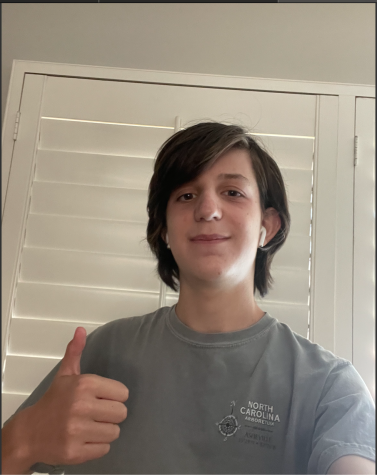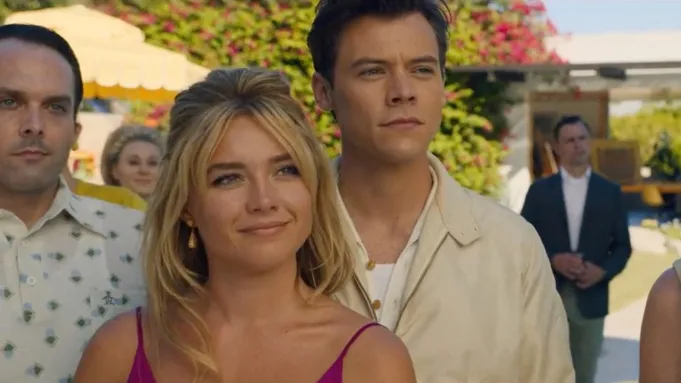Why the Controversy Surrounding ‘Don’t Worry Darling’ Causes Reasons to Worry, Darling
Florence Pugh and Harry Styles in ‘Don’t Worry Darling’, a film recently involved in unwarranted controversy.
The Social Network. Goodfellas. Fight Club. All movies that would rightfully hold a place in any critic’s best films of all time list. However, these three movies have also recently been subject to an unfair criticism. This same criticism was also levied against a certain recent film. The people behind the film hoped that it would overcome these judgements. And although it did not, it still represents one of the major problems with modern moviegoing.
In August 2019, just five months after the release of her directorial debut, Booksmart, Olivia Wilde’s second feature film was announced, titled Don’t Worry Darling. It was the subject of a bidding war between eighteen studios, and the original screenplay appeared on the Black List, an annual ranking of the best unproduced scripts. In 2020, superstars Florence Pugh, Chris Pine, and Harry Styles were announced to star in the film. That same year, the cast was rounded out with several other notables, including Nick Kroll and Gemma Chan. All signs seemed to point to Don’t Worry Darling becoming a big hit— critically and commercially— in a film landscape where original stories rarely do so.
But of course, this did not last very long, as controversy rose around the marketing of the film. The controversy around Don’t Worry Darling isn’t only because of one specific problem. Wilde has been criticized for demeaning Florence Pugh, for lying about firing Shia LaBeouf, and for being ‘too busy’ with Harry Styles, who had recently entered a relationship with Wilde.. And while these may or may not be true, there is one accusation that is much more ubiquitous than any of these. This accusation has also been applied to criticisms of The Wolf of Wall Street, Joker, and Nightcrawler. That controversial topic is the debate between whether something shown in a film is portrayed positively or negatively, and if everything portrayed is inherently a seal of approval.
Representation does not equal endorsement. Not everything that happens in a movie is a good idea! Take, for example, the 1990 film Goodfellas (spoilers ahead). Goodfellas is about criminals who do drugs, murder, steal, and participate in a lot more morally corrupt behavior. In return, they are punished by going to jail, or by having to give up their wealth. The movie takes a clear stance that if you live an indecent life, you will be reprimanded for it. However, it seems like this isn’t something that is always heeded by movie goers. It’s also something that has started relatively recently. In the 2021 book, ‘Leave the Gun, Take the Cannoli,’ by Mark Seal, Seal details that when adapting ‘The Godfather’ into a film the issue was not whether they could have gangsters as protagonists, it was whether they could portray gangsters without romanticizing them. Compare this to Disney’s new Pinocchio remake, where the trouble-making kids go from smoking cigars and drinking beer in the original to drinking root beer, hardly a crime warranting being turned into a donkey.
So how does this apply to Don’t Worry Darling, and by proxy, Olivia Wilde? The premise of Don’t Worry Darling is that a housewife (played by Pugh) discovers a dark secret about her town, and that she is being lied to. Since we know that there is a sex scene in the film (it was in the trailer), that scene would constitute as rape, since Pugh’s character is not fully informed of what her circumstances are. Hence, the idea of all actions in film having to be clean and moral is turned against Don’t Worry Darling. This film is even different from some of the films mentioned previously that (presumably) the antagonists of the movie are the ones committing moral indecency. When a hero commits a morally defunct act, then certainly an argument could be made that the film is glorifying that act. But that simply isn’t true in regards to Don’t Worry Darling, making the misinformation against Wilde and the film even more befuddling.
Has Don’t Worry Darling had many problems in terms of behind the scenes issues? Of course. However, this problem is different. It has nothing to do with the behavior of Olivia Wilde, or Harry Styles, or Florence Pugh. It only has to do with the mob mentality of toxic internet fandom. No matter what problems you have with the people who made the film, it’s clear that this is something that needs to be admonished. Otherwise, it’s only setting up more situations like this to come. And they’ve already started coming.

Micah Green is a senior at Milken, in his third year as a writer for The Roar. He is excited to be the Co-Editor-in-Chief and the producer for The Milken...




Benny Signer • Oct 24, 2022 at 2:25 pm
A swing and a hit!
Austin Cefalu • Oct 27, 2022 at 12:51 pm
Yeah!